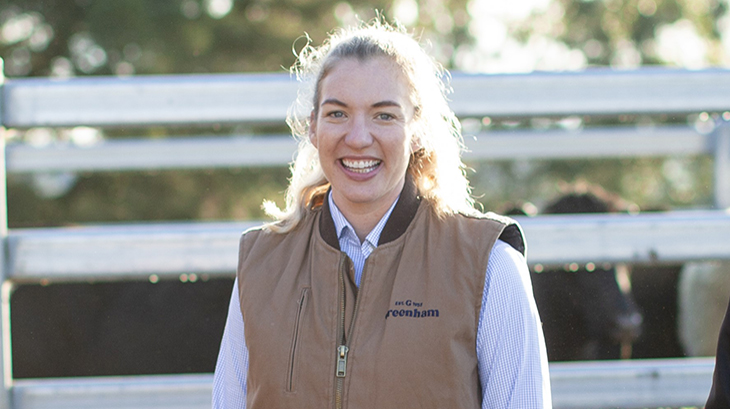Meet the SSG: Jess Loughland

SSG Member Jess Loughland
ABSF Sustainability Steering Group (SSG) member, Jess Loughland, will wear a few different hats when she visits Rockhampton for the industry’s peak event, Beef2024 from May 5-11.
As well as discussing the role the ABSF plays in strengthening the sustainability claims and confidence of Australian beef in global markets, she’ll be sharing her experience completing the 2023 Australian Agribusiness Leadership Program, and co-hosting the AMPC National Beef Carcase Competition Awards Dinner, which honours the dedicated producers and processors who’ve participated in the 12-month long competition.
And no doubt Jess will be fielding plenty of questions about Greenham’s new Sustainability Standard, aimed at bolstering the sustainability credentials of the company’s grass-fed beef supply chain.
As the Livestock Supply Chain Manager for Greenham, Jess Loughland has been busy bedding in the voluntary Greenham Beef Sustainability Standard (GBSS), designed to merge seamlessly with its 12-year-old NEVER EVER grassfed assurance standard.
“I was pleased with the positive response to the GBSS following launches in Victoria and Tasmania,” Ms Loughland said.
“About 70% of participants who completed post-event surveys said they were likely or very likely to take up a new opportunity.
“Our aim for 2024 is to onboard about 20 suppliers a month, mostly in Victoria, Tasmania, and southern NSW. Our biggest focus has been upskilling our livestock team to support the onboarding process which will be critical to scaling the program.”
Three-tier structure attracts US attention
The GBSS is the first commercial translation of the ABSF themes of animal welfare, environmental stewardship, economic resilience, and people and the community, to a company standard and is structured into three tiers.
Tier one prioritises education and planning and sets a baseline for sustainable management, while tiers two and three focus on continuous improvement, aiming for optimum ecological health, carbon neutrality, farm safety, and business management. Ongoing compliance will be assessed by independent auditors, Livestock Integrity Solutions Australasia.
Ms Loughland said there had been a lot of interest in the new standard, particularly from the USA, where Greenham established an office last year.
“We’ve had a really good response from our US customer base, particularly with regards to the ‘Certified Regenerative’ claim, and the Sales team is working hard to scale the program with our dedicated customer base since opening our office in Boulder, Colorado,” she said.
Beef sourced from properties that meet at least tier two of the GBSS is eligible for an on-pack “Certified Regenerative” label and associated financial premiums.
“The team is strengthening market links within the US, working to capitalise on the growing demand for regenerative beef. Our marketing team is also working on a new Regenerative beef brand for cattle sourced under the GBSS.”
Collaboration accelerates change
Harnessing cross-industry collaboration, Greenham has been sharing its learnings from the development and implementation of the GBSS with other commodities such as aquaculture, dairy and wool.
“We will be hosting a tour to one of our accredited farms in May and in turn, we’ll get to visit other business to see how they’re demonstrating the sustainability of their supply chains.
"Collaboration makes sense for accelerating change, particularly in southern Australia where there’s so much mixed farming. It provides producers with consistency, reducing duplication and the subsequent compliance burden.
“It was also really important to us that the GBSS was aligned with frameworks and goals such as the ABSF and CN30, so that we aren’t sending different signals around future market needs.”
Asked if Greenham would make the standard compulsory for their producers, Ms Loughland said it’s likely that tier one would be embedded in the NEVER EVER Program in time, but not yet.
“Right now, the program is opt-in but a lot of tier one is aimed at verifying current practices on farm, and supporting education around more complex topics like carbon and biodiversity,” she said.
“We’re finding that most producers are already meeting most of the tier one requirements but integrating that into our NEVER EVER audit will enable us strengthen our claims to our customers across a range of sustainability matters.”